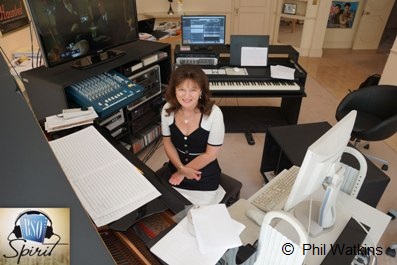
|
«It’s always very special to be able to conduct my music live in front of an audience» Hi Debbie, thank you so much for the opportunity of this interview, Spanish film music fans are eager to know your own vision about your career and an insight view about your compositions and the scores we all have fallen in love with. -You have been pointed out as one of the most successful female composers in the film music industry during the last three decades, but you are a renowned conductor and presenter as well, please tell us about your beginnings, your background and how the first work as composer came out (and maybe some anecdote about these starting point?). -Which was the moment of truth, that precise instant when you knew your illusions and your reality achieved their perfect match, and you found yourself in the right path to become a composer? -I am not sure if you know, but two of the most beloved scores of the last decades in terms of classicism and importance for the film music aficionado are Tom & Viv, and Wilde (they have been voted as two of the best in several film music charts & forums). After having composed those scores several years ago, and now, remembering that time, how do you feel about your body of work, and specially about these particular scores?, could you share with us your experience creating them and your personal feelings about the films and the work with the filmmakers? -Speaking of awards, nominations, and all these things composers are not aware of while working, but certainly rewarding when the job is finished and you are proud of it, you have been nominated for two Ivor Novello Awards for Wilde and Death of Yugoslavia, you won a TRIC Award for The Good Guys, and an RTS Award for Warriors, and in you received the Gold Badge of Merit by the British Academy of Composers & Songwriters. Tell us about your feelings when you dedicate yourself with so much integrity and courage to your profession and you sense people really appreciate your work. Maybe some anecdote of these Awards Ceremonies? Of course it’s lovely to receive awards, but it’s not the reason I became a composer! I do the job because I have a passion for music and simply love creating music for film. Award ceremonies can be entertaining, though, and sometimes not for the usual reasons – I do remember at the RTS Awards, when I won for Warriors, my Aunt was sitting at our table and when my name was called out she literally fell off her chair on to the floor! I had to help her back on to her chair as I got up to accept the award, because otherwise I would have had to step over her to get to the stage!! -Let’s focus now in some scores you have created for different genres and films that you could say are not related at all between them, but all have a particular thing in common, their music is rich, thematic, and does not forget melodies to bind them together in music aficionado’s memory. We are talking about Tom’s Midnight Garden, Arsene Lupin, & Haunted. We think they are very different, and at the same time very alike, because you can feel the sense of purpose and the structure of the musical composition, till the very last note, even in lyrical melodies or action passages and exciting rhythms, or emotional beauty. Please, share with us your process for these three different films, your work with directors and productions, and how do you value them within your career. I must confess they are my personal three favorites with Wilde & Tom & Viv. Let’s start with Tom’s Midnight Garden. -Arsene Lupin (how did you contact this French production at first?, is it very different than to work in the Great Britain?): -And about Haunted? -You were commissioned by Warner Classics / Teldec to write the music for a wonderful recording of two Oscar Wilde tales narrated no less than by Stephen Fry (who portrayed Oscar Wilde in the film Wilde) and Vanessa Redgrave (who played his mother in the same film). How did you approached this project and how was the more direct collaboration with this two artist that already appeared in the film about the famous writer? -You also composed «The Ugly Duckling» (with the voice of Nigel Havers) that was included in your album «Something Here», and also «The Christmas Party» (narrated by George Layton). Are you especially fond of this kind of projects? Can we expect more works of with voice and music composed by you? -We’ll focus now in two productions defined by the suspense, Lighthouse, with only one melodic theme through the whole score, and Flood, where the rhythms and motifs and relentless with such a sense of pathos and ostinato driven melodies that the heart of the listener is pounding fast during the whole score. How was to start working in these different scores from film to television, and the process of creating them?, and please, share with us some anecdote about your collaboration with another of our most admired artist, like Hayley Westenra, how did you decided to bring Hayley to this British television film and how was your work with her? (I must say that the emotion you reach with the music makes me cry every time in the emotional passages, thank you so much, dear Debbie). Lighthouse was my first horror score and a chance to move away from the melodic scores that I had been composing previously. I used a lot of percussion, brass and strings, and wanted to create a dark, suspenseful, atmospheric score. The action scenes were particularly rewarding – lots of hammering percussion! -Now we are going to horror and humor territory, with Lesbian Vampire Killers, one impressive score, but maybe atypical (this film is a mixture between humor & terror, sometimes with excessively easy jokes, that your music elevates to another category). How were you attached to this film, and could you share with us your remembrances working with Mr. Claydon? -Talk us please about your CD for solo piano, Piano Stories, and about these ideas of adapting your music forgetting the orchestra and making it more intimate and even more haunting for the listener. -Please, explain to us especially for those who don’t know this CD, your experience with Different Voices, where you join elements together and explain them, in what we feel as an educational experience. Was your intention to do it for children who are learning to create in them the interest or help them falling in love with music? -I don’t know if you feel yourself as a very prolific composer, but certainly some of your works haven’t reached the cd market, would you like to be more represented in Cd releases?, sadly some of your scores are not available, and people would love to see them reaching the light of day, are you thinking in helping some of your scores to be released by any label in the near future? -How do you feel according to work in terms of television or film?, are there any differences approaching the music in terms of composition, or is it the budget mainly the principal difference?. Could you explain to us the usual process in TV with deadlines and maybe a sense of no time for everything in opposition with film scores, or maybe is it the other way around ;-)? The process of composition is exactly the same whether you are writing for film or TV – it is all music to picture and the job of the composer is to find the musical language that completely suits the images. The deadline can be very tight on television productions – sometimes only 2 to 3 weeks for an hour-long episode with perhaps 30-40 minutes of music in it. It can also be very tight on a film though – depending on when you are brought on board. I have written film scores in 3-4 weeks too! In the end, it all comes down to the individual production. I am used to working to tight deadlines now though, and have come to enjoy the adrenalin rush! -Could you share with us your thoughts and make a presentation of two of the Tv projects you have been working lately but are not already released in Spain like Father Brown and WPC 56?, Tell us about the music and style of the composition and about the possibility of a release of it, please. WPC 56 is also set in the 1950s, but this time it is about a woman police officer. I wanted to get a feeling of the period without it sounding like pastiche. It’s a very different ensemble for me – I chose to use harmonica as the lead instrument which gives it a wonderful period feel. Alongside the harmonica there are 50s style guitars, bass, drums, percussion, and a string section. It was great to write for harmonica – again, it was the first time it has been featured in one of my scores. The harmonica solos were performed by a wonderful musician called Adam Glasser who added a huge amount to the score. Sadly, at the moment, it may not be possible to release these two scores for financial reasons. There is a brand new series of Father Brown coming up though – so you never know in the future! -You are part of the wonderful society of British female film composers along with Rachel Portman, Anne Dudley, Jennie Muskett, Deborah Mollison, or Sarah Class, among others, do you know some of them, or maybe all of them?, do you feel that maybe we are living a new Golden Age in the British film music world with such talented musicians and composers? Last year for instance during the Córdoba Film Music Festival, a panel about women in the film music industry were presented with great success, from the perspective of agents and composers (Rachel Portman, Doreen Ringer Ross, Beth Krakower and Miriam Cutler). It is wonderful that there are more female composers in the business. I hope that the fact that there are now many more successful female composers will encourage more young women to feel that they have a chance and can give it a go! I’ve never felt that I have been held back by being a female composer – of course, it is a very male-dominated world, but if you want something enough and have a passion for it, then gender is irrelevant! I have had the pleasure of meeting Rachel, Anne, and Jennie on various occasions – sometimes on awards juries or at music industry events. Last year I was on a boat with Anne Dudley (and ten other composers, and an orchestra to conduct!) during the Queen’s Diamond Jubilee as we were commissioned to compose new “Water Music” for the Jubilee Pageant! -Talking about the incoming tenth anniversary of the Córdoba International Film Music Festival, you will attend this edition for the first time and will present a panel, what can you tell us about your impressions attending the event, and offering the fans your music first hand in concerts live, and being part of the signing sessions and panels? (you will just see the faces of people, the smiles and sparkle in their eyes when they have the chance to know their beloved composers, it is so beautiful and unforgettable for everybody, well, this is not part of the interview, but I must thank you so so so much for attending this year’s edition, you are making hundreds of people very happy, thank you from the deep of my heart) -Tell us, please, about your experience as conductor and your concerts, a couple of friends attended last December your event in London, The Christmas Party, with George Layton, how was the experience?, are any other concerts scheduled in the near future? -Finally, to end this lovely interview, could you share with us, the readers of BSOSpirit and the future attendants to the Festival, your projects around the corner, anything you could tell us in advance and does not put yourself in trouble, haha. I am working on the new BBC series of Father Brown – 15 new episodes this time! I am also scoring Wolf Hall which is a BBC series based on the award-winning novel by Hilary Mantel. This is special as I will be working with the director Peter Kosminsky again – it will be our 6th collaboration! Thank you very very much for the honor of this interview. A big hug from Spain. Y un gran abrazo de mi parte a todos ustedes! Looking forward to meeting you all in Cordoba very soon.
Special thanks to Miguel Garre for his help in the preparation of this interview questions. |
Author BIO: Debbie Wiseman is a British composer born in London in 1963, a prominent melody creator with a symphonic tradition. Although her first compositions for TV are dated in the early eighties the score that put her on the map was “Tom & Viv” (1994), that along with “Haunted” (1995) and Wilde (1997) proved her craft and skills for film music , with works full of a classic touch and great beauty. Scores like “Tom’s Midnight Garden” (1999), “Warriors” (1999), «Absolute Truth» (1998), «My Uncle Silas» (2000) or «Middletown» (2006), among others, came to confirm her splendid melodic vein. She has proved herself more than capable of great symphonic compositions for disaster movies (“Flood”, 2006), the fantastic genre (“Lesbian Vampire Killers”, 2008), or suspense music (“Lighthouse”, 1999). Another of her most remarkable efforts is the French production “Arsene Lupin” (2004), demonstrating her domain of a huge symphonic orchestra and capacity for action music. Nowadays she continues composing for British Television (“Father Brown”, “WPC 56”), and TV movies (“The Whale”, “A Poet in New York”). She conducts concerts periodically, Christmas ones and based in her previous works. Debbie has been nominated for two Ivor Novello Awards for «Wilde» and «Death of Yugoslavia», and has won a TRIC Award for «The Good Guys» and an RTS Award for «Warriors». In 2007 she was awarded with the Gold Badge of Merit by the British Academy of Composers & Songwriters.

Debbie Wiseman ‘sWebsite: |


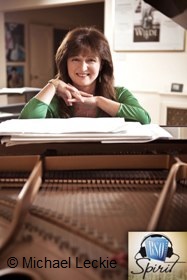
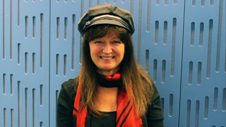 After leaving music college I knew that I wanted to write music for pictures. My natural composing style is to write melodic music, and I felt that the best opportunity to compose such music would be within a film or television production. So, when I finished my degree course at the Guildhall School of Music and Drama in London, I prepared a showreel of my music that had been recorded in the college’s studio facility. One of the pieces on the showreel was a choral piece that I’d written and recorded with the college’s choir. I then sent the showreel out to about 100 producers and directors, and after quite a long time I received one single reply! It was from a director who was making a drama/documentary for Channel 4 and he had in his mind that it would be interesting to have a choral score for the film. He’d heard my piece on the showreel and felt that it was the kind of music that could work for his film. He invited me in for a meeting and offered me the job – I was thrilled! After I’d completed the film, the same production company then went on to produce many more films for the BBC and Channel 4 and asked me to write more music for them. So, after a year I had credits and a much more impressive showreel!
After leaving music college I knew that I wanted to write music for pictures. My natural composing style is to write melodic music, and I felt that the best opportunity to compose such music would be within a film or television production. So, when I finished my degree course at the Guildhall School of Music and Drama in London, I prepared a showreel of my music that had been recorded in the college’s studio facility. One of the pieces on the showreel was a choral piece that I’d written and recorded with the college’s choir. I then sent the showreel out to about 100 producers and directors, and after quite a long time I received one single reply! It was from a director who was making a drama/documentary for Channel 4 and he had in his mind that it would be interesting to have a choral score for the film. He’d heard my piece on the showreel and felt that it was the kind of music that could work for his film. He invited me in for a meeting and offered me the job – I was thrilled! After I’d completed the film, the same production company then went on to produce many more films for the BBC and Channel 4 and asked me to write more music for them. So, after a year I had credits and a much more impressive showreel!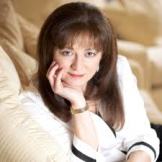 It was more of a slow build, rather than a precise moment! Many projects along the way have been important though…my first feature film Tom & Viv and also my collaborations with the director Peter Kosminsky on projects such as Warriors and The Promise have been very rewarding . My score for Wilde was important too as it generated many other commissions, including numerous projects with Stephen Fry which have been hugely enjoyable.
It was more of a slow build, rather than a precise moment! Many projects along the way have been important though…my first feature film Tom & Viv and also my collaborations with the director Peter Kosminsky on projects such as Warriors and The Promise have been very rewarding . My score for Wilde was important too as it generated many other commissions, including numerous projects with Stephen Fry which have been hugely enjoyable.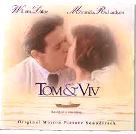 It’s interesting that it is these two works that you mention. Both of them were directed by Brian Gilbert and have very different stories behind them! Tom & Viv was the first time I’d composed a film score and the first time I’d worked with Brian Gilbert. I remember writing quite a lot of music for some of the early scenes and Brian coming over to my house and listening to them and only liking one of the themes that I played to him on the piano! That one theme became the heart of the score.
It’s interesting that it is these two works that you mention. Both of them were directed by Brian Gilbert and have very different stories behind them! Tom & Viv was the first time I’d composed a film score and the first time I’d worked with Brian Gilbert. I remember writing quite a lot of music for some of the early scenes and Brian coming over to my house and listening to them and only liking one of the themes that I played to him on the piano! That one theme became the heart of the score. 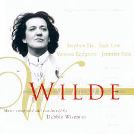 On Wilde I was left with just three and a half weeks to compose the entire score! There had been problems in the production and so I was brought on board very late. Luckily, the music flowed well and the recording at Abbey Road studios took place exactly 4 weeks after the first day I watched the film!
On Wilde I was left with just three and a half weeks to compose the entire score! There had been problems in the production and so I was brought on board very late. Luckily, the music flowed well and the recording at Abbey Road studios took place exactly 4 weeks after the first day I watched the film!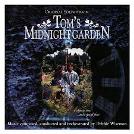 You have chosen three of my favourite films, so it’s easy for me to tell you about them! The director of Tom’s Midnight Garden, Willard Carroll, called me about the possibility of scoring his film and I was very excited as I had loved the book as a child. It was a great opportunity for a composer, with many magical moments within the film where the music could be lyrical and symphonic. It was a terrific experience working with Willard – he was hugely supportive of the composing process and seemed to love every moment of it. At the recording session, the author of the book, Philippa Pearce, came along to hear the score being recorded. It was a very special moment meeting her, and I was thrilled to have been chosen to write music for her wonderful story.
You have chosen three of my favourite films, so it’s easy for me to tell you about them! The director of Tom’s Midnight Garden, Willard Carroll, called me about the possibility of scoring his film and I was very excited as I had loved the book as a child. It was a great opportunity for a composer, with many magical moments within the film where the music could be lyrical and symphonic. It was a terrific experience working with Willard – he was hugely supportive of the composing process and seemed to love every moment of it. At the recording session, the author of the book, Philippa Pearce, came along to hear the score being recorded. It was a very special moment meeting her, and I was thrilled to have been chosen to write music for her wonderful story.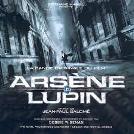 I was first contacted by the music supervisor on the film who wanted me to meet with the director, Jean-Paul Salome, as he felt my music would be suitable for the project. They had to use a British composer as part of the film was financed in the UK, so I went to Paris to meet with Jean-Paul. It was a great meeting, even though my French is not very good! The music supervisor managed to translate for us both during the meeting and I decided that it would be a fascinating film to score. What I didn’t realise at the time was that there would be over two hours of music in the film! It was, without doubt, one of the most challenging and rewarding projects of my career. The scale of the project and the opportunity to compose epic orchestral music was a real highlight of my career. We recorded the score over a week at Abbey Road Studios with the Royal Philharmonic Orchestra and conducting the score was a hugely memorable experience.
I was first contacted by the music supervisor on the film who wanted me to meet with the director, Jean-Paul Salome, as he felt my music would be suitable for the project. They had to use a British composer as part of the film was financed in the UK, so I went to Paris to meet with Jean-Paul. It was a great meeting, even though my French is not very good! The music supervisor managed to translate for us both during the meeting and I decided that it would be a fascinating film to score. What I didn’t realise at the time was that there would be over two hours of music in the film! It was, without doubt, one of the most challenging and rewarding projects of my career. The scale of the project and the opportunity to compose epic orchestral music was a real highlight of my career. We recorded the score over a week at Abbey Road Studios with the Royal Philharmonic Orchestra and conducting the score was a hugely memorable experience.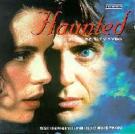 Haunted was the first time I had the opportunity to work with the veteran director, Lewis Gilbert. We got on so well immediately and his enthusiasm was an inspiration. The main theme started at the very beginning of the film where we see a woman playing at the piano. I composed that piece first and then it developed throughout the film in various different guises – sometimes eerie, sometimes unsettling, sometimes romantic! A few years later I was asked to score Before You Go, another film directed by Lewis Gilbert. He was in his 80s when he directed this film and had more energy than anyone else on the set! He is a wonderful man and I was very fortunate to have the opportunity of collaborating with him twice in his career.
Haunted was the first time I had the opportunity to work with the veteran director, Lewis Gilbert. We got on so well immediately and his enthusiasm was an inspiration. The main theme started at the very beginning of the film where we see a woman playing at the piano. I composed that piece first and then it developed throughout the film in various different guises – sometimes eerie, sometimes unsettling, sometimes romantic! A few years later I was asked to score Before You Go, another film directed by Lewis Gilbert. He was in his 80s when he directed this film and had more energy than anyone else on the set! He is a wonderful man and I was very fortunate to have the opportunity of collaborating with him twice in his career.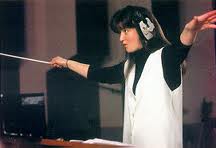 I received a call from Warner Classics saying that they wanted to commission music to accompany the fairy stories of Oscar Wilde for a CD release. They had enjoyed my music for the film and so I think that was why they contacted me! I was very interested by this idea – I read the fairy stories and felt inspired by them immediately. They are written very musically, with a natural rhythm. It was thought that it would be a good idea to occasionally let the music breathe away from the narration, so at times the music takes over and there are solos for the flute, piano, violin and cello. The team at Warner Classics thought immediately of Stephen Fry and Vanessa Redgrave as they enjoyed their performances in the film. They contacted them and they both said yes immediately – we were very privileged to have them as the voices of the fairy stories. Since the album was released I’ve conducted the stories live on stage with several different narrators. They are quite sad stories though, and I remember conducting an afternoon concert for children a few years ago and we performed The Nightingale and the Rose – there were quite a lot of teary-eyed children after the performance! I felt guilty that we’d made them upset!
I received a call from Warner Classics saying that they wanted to commission music to accompany the fairy stories of Oscar Wilde for a CD release. They had enjoyed my music for the film and so I think that was why they contacted me! I was very interested by this idea – I read the fairy stories and felt inspired by them immediately. They are written very musically, with a natural rhythm. It was thought that it would be a good idea to occasionally let the music breathe away from the narration, so at times the music takes over and there are solos for the flute, piano, violin and cello. The team at Warner Classics thought immediately of Stephen Fry and Vanessa Redgrave as they enjoyed their performances in the film. They contacted them and they both said yes immediately – we were very privileged to have them as the voices of the fairy stories. Since the album was released I’ve conducted the stories live on stage with several different narrators. They are quite sad stories though, and I remember conducting an afternoon concert for children a few years ago and we performed The Nightingale and the Rose – there were quite a lot of teary-eyed children after the performance! I felt guilty that we’d made them upset!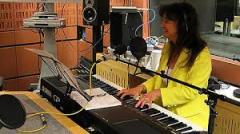 As I’m often writing music to accompany dialogue within a film or television production, it feels very natural to me to write music to accompany a story or poem. I love the combination of voice and music and I’d certainly love to write more in this style. The most recent settings were two of George Layton’s stories – “The Fib” and “The Christmas Party”. Both are clever, touching, humorous stories and I’ve conducted them both in concert – with George himself narrating.
As I’m often writing music to accompany dialogue within a film or television production, it feels very natural to me to write music to accompany a story or poem. I love the combination of voice and music and I’d certainly love to write more in this style. The most recent settings were two of George Layton’s stories – “The Fib” and “The Christmas Party”. Both are clever, touching, humorous stories and I’ve conducted them both in concert – with George himself narrating.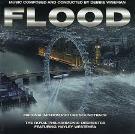 Flood was a different project in that I was brought in very late in the production process, and had to work very quickly. The main request was for me to come up with a theme for the flood, almost as if it was a character itself. The flood was relentless, and unstoppable, so I wanted to create a theme that felt intense and powerful, with a constant rhythm. The second part of the film, after the flooding, has a very different feel. It’s very much the calm after the storm. There was a scene at the start of Part 2 where we are looking at London underwater, and the devastation which has engulfed the city. I remember the producer saying that although it was horrific and sad, that the music should still have a sense of beauty about it – almost to completely contrast the images on screen. That was the moment that I felt a single female voice would work beautifully to create the sense of loneliness and serenity. I asked singer Hayley Westenra if she would record the theme for me and I was thrilled that she agreed! I love the purity of her sound – I was able to write for her voice as I would a solo instrument of the orchestra. She performed the theme beautifully and I really hope to have another opportunity to compose for her again soon.
Flood was a different project in that I was brought in very late in the production process, and had to work very quickly. The main request was for me to come up with a theme for the flood, almost as if it was a character itself. The flood was relentless, and unstoppable, so I wanted to create a theme that felt intense and powerful, with a constant rhythm. The second part of the film, after the flooding, has a very different feel. It’s very much the calm after the storm. There was a scene at the start of Part 2 where we are looking at London underwater, and the devastation which has engulfed the city. I remember the producer saying that although it was horrific and sad, that the music should still have a sense of beauty about it – almost to completely contrast the images on screen. That was the moment that I felt a single female voice would work beautifully to create the sense of loneliness and serenity. I asked singer Hayley Westenra if she would record the theme for me and I was thrilled that she agreed! I love the purity of her sound – I was able to write for her voice as I would a solo instrument of the orchestra. She performed the theme beautifully and I really hope to have another opportunity to compose for her again soon.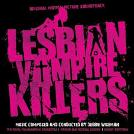 I remember meeting Phil Claydon, the director, for the first time in a pub in North London! He has a very warm personality and was so enthusiastic about the film it was infectious. The script was very funny and I knew that I would have the opportunity to compose a very multi-faceted score. There was drama, comedy, horror, action – all wrapped up in one film! Phil is also a massive film music fan with a huge collection of film scores, so he loved every moment of the scoring process. We recorded the score at Air Studios in London. It was wonderful to work with the Crouch End Festival Chorus too – such a terrific choir. They added a huge amount to the score. It was also another opportunity to write some solos for Hayley Westenra which was hugely enjoyable.
I remember meeting Phil Claydon, the director, for the first time in a pub in North London! He has a very warm personality and was so enthusiastic about the film it was infectious. The script was very funny and I knew that I would have the opportunity to compose a very multi-faceted score. There was drama, comedy, horror, action – all wrapped up in one film! Phil is also a massive film music fan with a huge collection of film scores, so he loved every moment of the scoring process. We recorded the score at Air Studios in London. It was wonderful to work with the Crouch End Festival Chorus too – such a terrific choir. They added a huge amount to the score. It was also another opportunity to write some solos for Hayley Westenra which was hugely enjoyable.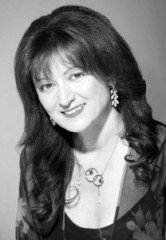 I was asked to perform at my old music college – the Guildhall School of Music and Drama – as part of their anniversary celebrations. At this concert, I performed a couple of my scores at the piano and the writer and film music journalist, Michael Beek, was there. After the concert he suggested the idea of recording an album of my film scores, but just on solo piano. At first, I was a little unsure, but the more I thought about it the more I started to like the idea! I suggested it to Warner Classics, who had released the Oscar Wilde fairy stories album, and they were very enthusiastic. With them on board, and Michael Beek producing the album, I set about re-arranging all my scores for solo piano, andpractisingthem like crazy before the recording sessions! It was a fantastic experience and I was overwhelmed when the album entered the UK Classical Chart at number 10! It was lovely to take the scores back to their original form – I always compose at the piano, and then orchestrate the music, so it felt quite natural to do the process in reverse and take away all the orchestration, leaving just the pure melody.
I was asked to perform at my old music college – the Guildhall School of Music and Drama – as part of their anniversary celebrations. At this concert, I performed a couple of my scores at the piano and the writer and film music journalist, Michael Beek, was there. After the concert he suggested the idea of recording an album of my film scores, but just on solo piano. At first, I was a little unsure, but the more I thought about it the more I started to like the idea! I suggested it to Warner Classics, who had released the Oscar Wilde fairy stories album, and they were very enthusiastic. With them on board, and Michael Beek producing the album, I set about re-arranging all my scores for solo piano, andpractisingthem like crazy before the recording sessions! It was a fantastic experience and I was overwhelmed when the album entered the UK Classical Chart at number 10! It was lovely to take the scores back to their original form – I always compose at the piano, and then orchestrate the music, so it felt quite natural to do the process in reverse and take away all the orchestration, leaving just the pure melody.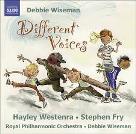 Different Voices was originally commissioned as part of the Royal Philharmonic Orchestra’s 60th birthday celebrations. The manager and director of the orchestra, Ian Maclay, suggested to me that it would be exciting to have a new “Young Person’s Guide to the Orchestra”. The orchestra had played Benjamin Britten’s iconic piece for many years and they felt it was time for them to play a new work which introduced all the different sections of the orchestra to the audience in an accessible way. I decided to write it for young people to enjoy, and I also had in mind that it would be great if school and youth orchestras could perhaps play the piece too. So, I composed the music with that in mind and a story was devised, and a song too, with lyrics by Don Black. Once again, I asked Hayley Westenra to sing the song, and Stephen Fry narrated the story in its premiere performance at Cadogan Hall. I’m happy to say that the piece has been played by many youth orchestras, schools, and amateur orchestras since its first performance in 2007.
Different Voices was originally commissioned as part of the Royal Philharmonic Orchestra’s 60th birthday celebrations. The manager and director of the orchestra, Ian Maclay, suggested to me that it would be exciting to have a new “Young Person’s Guide to the Orchestra”. The orchestra had played Benjamin Britten’s iconic piece for many years and they felt it was time for them to play a new work which introduced all the different sections of the orchestra to the audience in an accessible way. I decided to write it for young people to enjoy, and I also had in mind that it would be great if school and youth orchestras could perhaps play the piece too. So, I composed the music with that in mind and a story was devised, and a song too, with lyrics by Don Black. Once again, I asked Hayley Westenra to sing the song, and Stephen Fry narrated the story in its premiere performance at Cadogan Hall. I’m happy to say that the piece has been played by many youth orchestras, schools, and amateur orchestras since its first performance in 2007.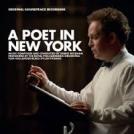 Of course, it’s always very gratifying to have a CD release of a score, but not every project is suitable for various reasons. The most usual reason is that it can be too expensive to release the score if there are many musicians performing the music and the soundtrack rights may not have been cleared. So, sadly, some scores can only be heard within the production. I’m happy to be able to let you know though that my most recent score for the BBC film A Poet In New York will be released soon! The film tells the story of the last few weeks in the life of Dylan Thomas and the music was performed by the Royal Philharmonic Orchestra.
Of course, it’s always very gratifying to have a CD release of a score, but not every project is suitable for various reasons. The most usual reason is that it can be too expensive to release the score if there are many musicians performing the music and the soundtrack rights may not have been cleared. So, sadly, some scores can only be heard within the production. I’m happy to be able to let you know though that my most recent score for the BBC film A Poet In New York will be released soon! The film tells the story of the last few weeks in the life of Dylan Thomas and the music was performed by the Royal Philharmonic Orchestra.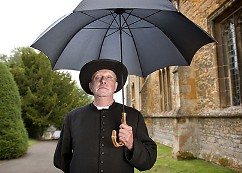 Father Brown is a series based on the short stories of G.K.Chesterton. It’s about a priest who becomes an accidental detective, and each episode has its own self-contained murder/mystery! It’s set in the 1950s and the producer suggested that the music should have an “Ealing comedy” feel, so it’s quite quirky at times. It’s an orchestral score but the lead instrument for Father Brown is often the vibraphone – it’s the first time I’ve used the vibraphone as a lead instrument, but it seemed to really suit the character of Father Brown.
Father Brown is a series based on the short stories of G.K.Chesterton. It’s about a priest who becomes an accidental detective, and each episode has its own self-contained murder/mystery! It’s set in the 1950s and the producer suggested that the music should have an “Ealing comedy” feel, so it’s quite quirky at times. It’s an orchestral score but the lead instrument for Father Brown is often the vibraphone – it’s the first time I’ve used the vibraphone as a lead instrument, but it seemed to really suit the character of Father Brown.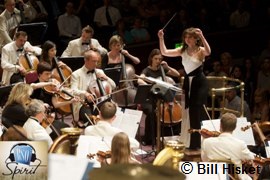 It is a great honour to be able to attend this year’s Festival – I am looking forward to it hugely. I’m particularly looking forward to conducting the orchestras and to meeting the fans of film music – it makes me very happy to meet the people who appreciate and really understand music in film. I’m already planning the music that I will be conducting at the concerts – and the panel and signing session will be a great opportunity to meet everyone in person.
It is a great honour to be able to attend this year’s Festival – I am looking forward to it hugely. I’m particularly looking forward to conducting the orchestras and to meeting the fans of film music – it makes me very happy to meet the people who appreciate and really understand music in film. I’m already planning the music that I will be conducting at the concerts – and the panel and signing session will be a great opportunity to meet everyone in person.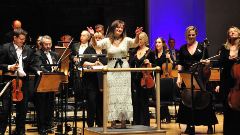 It’s always very special to be able to conduct my music live in front of an audience. Most of my time is spent in a studio where there’s always the possibility of a second take! In a concert, there is only one take, and the audience tell you immediately if they have enjoyed it! It’s one of the most enjoyable parts of my job, and if I had time I would love to conduct a concert every week! The Christmas concert with the RPO was a great success this year, raising much money for the Breast Cancer Campaign charity – everyone was delighted. We are planning another concert for December 2015 – also at Cadogan Hall with the RPO. Hopefully, you and your friends will be able to attend!
It’s always very special to be able to conduct my music live in front of an audience. Most of my time is spent in a studio where there’s always the possibility of a second take! In a concert, there is only one take, and the audience tell you immediately if they have enjoyed it! It’s one of the most enjoyable parts of my job, and if I had time I would love to conduct a concert every week! The Christmas concert with the RPO was a great success this year, raising much money for the Breast Cancer Campaign charity – everyone was delighted. We are planning another concert for December 2015 – also at Cadogan Hall with the RPO. Hopefully, you and your friends will be able to attend!
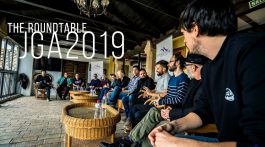
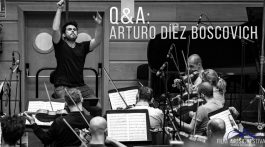
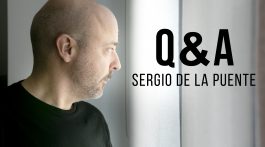
No hay comentarios